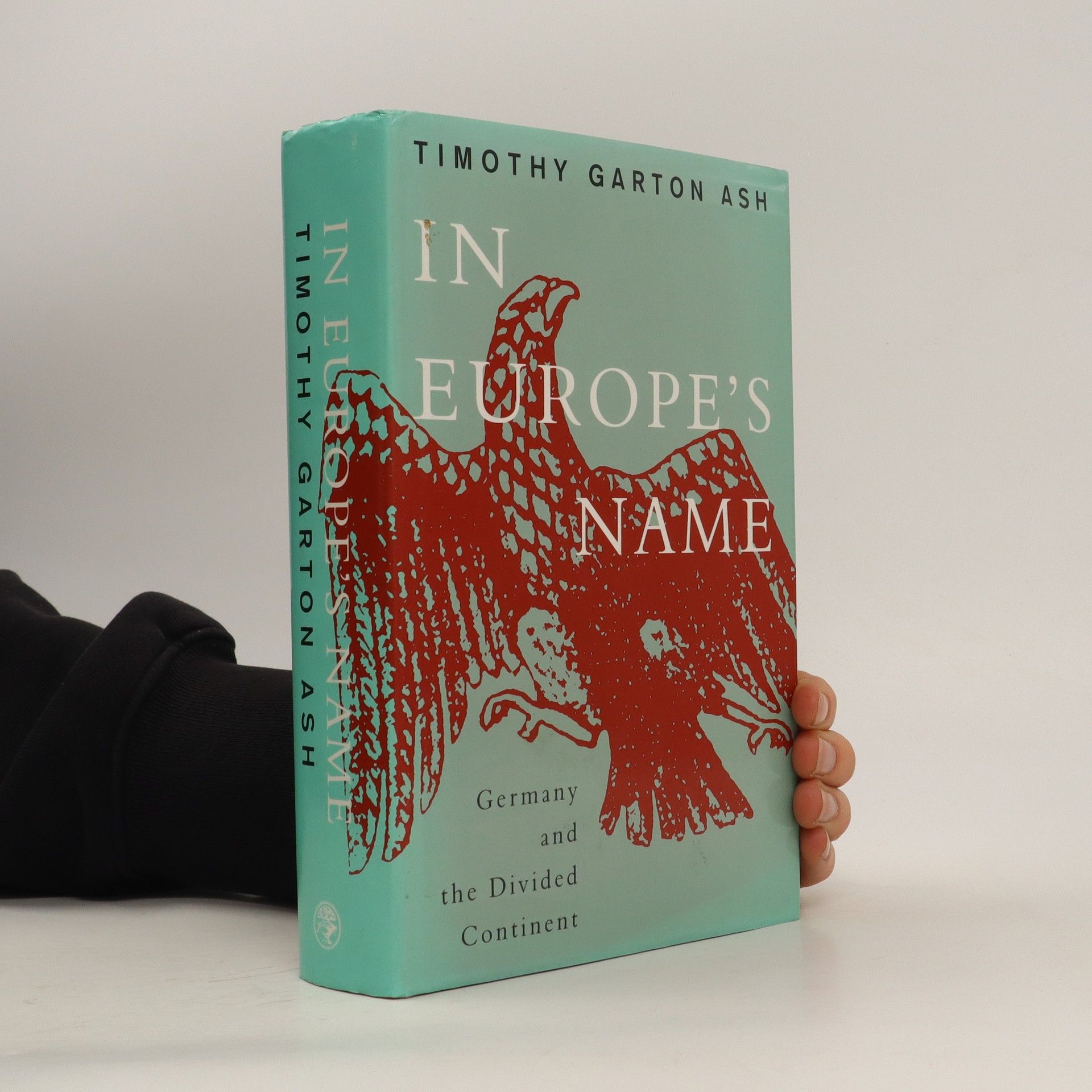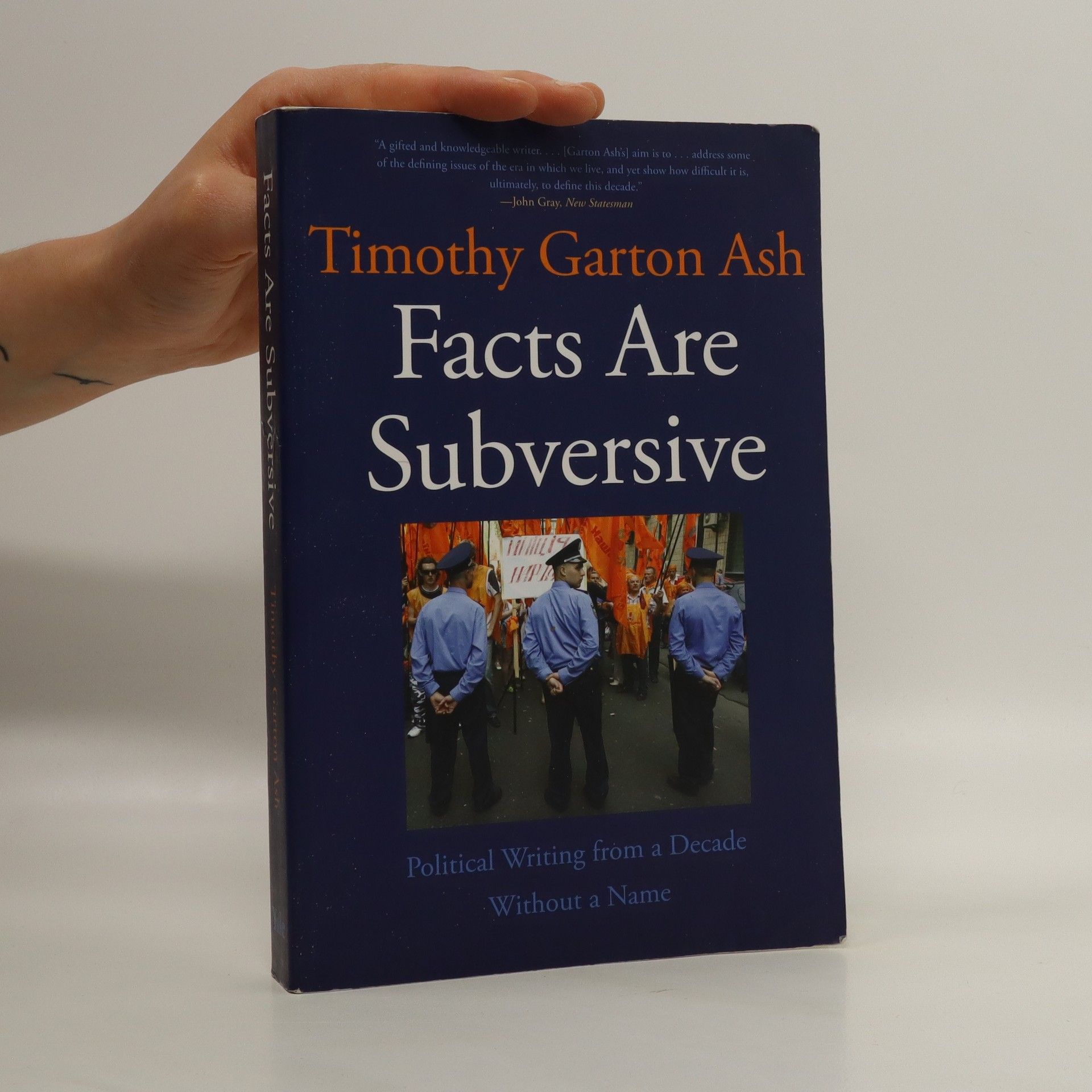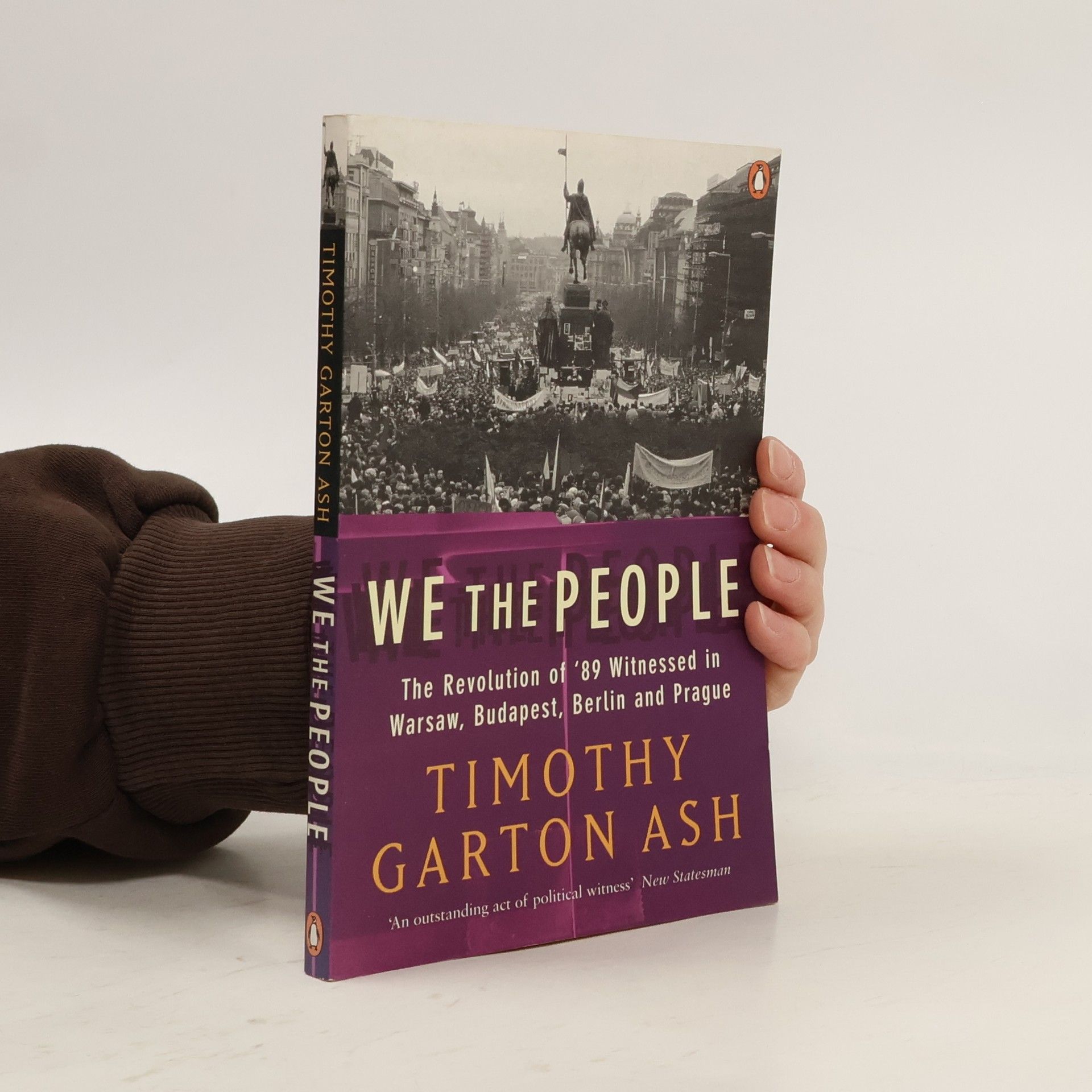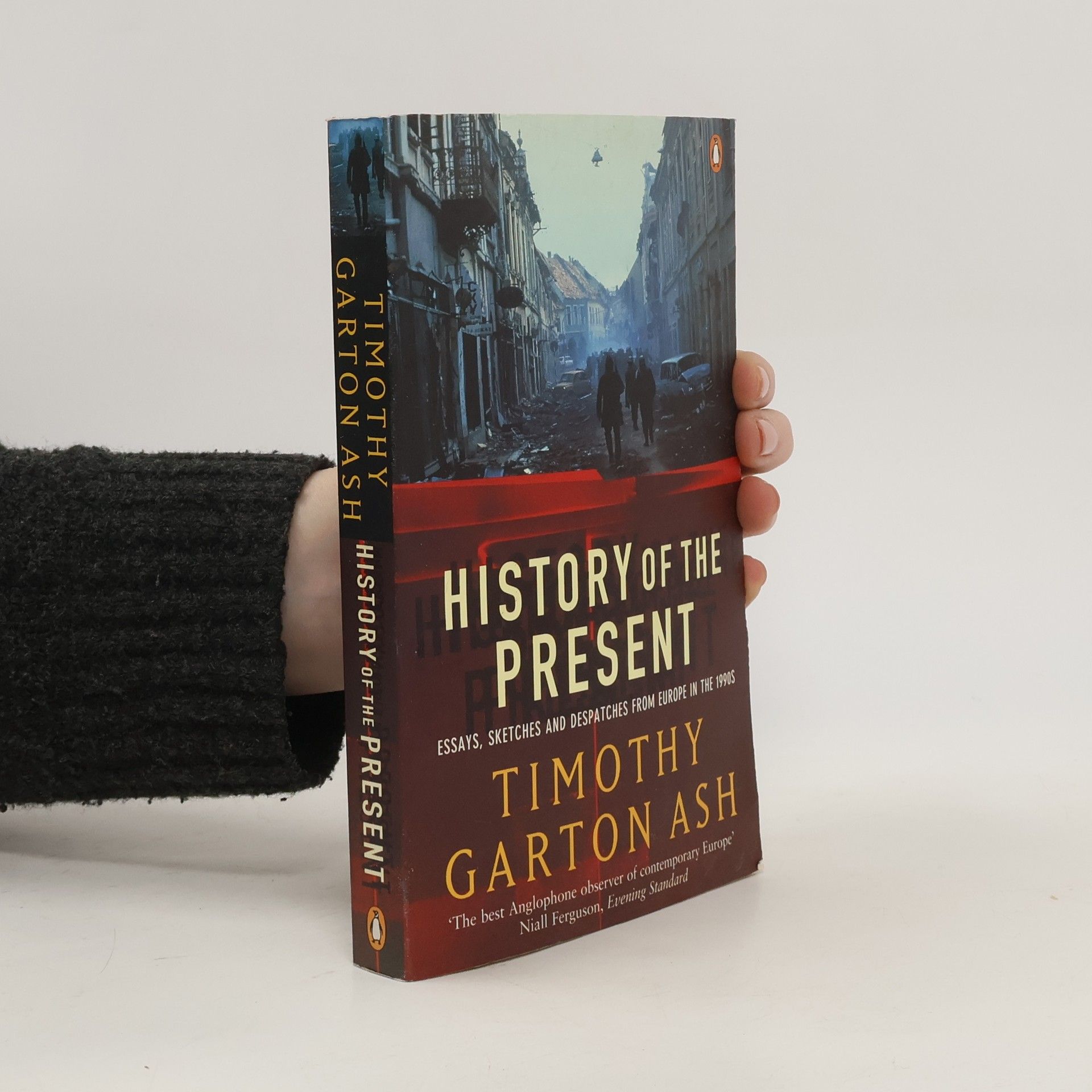Timothy Garton Ash Libros
Timothy Garton Ash es un historiador y autor británico cuyo trabajo se centra en la historia moderna tardía y contemporánea de Europa Central y del Este. Sus escritos profundizan en los cruciales cambios políticos y sociales dentro de esta región. Ash se distingue por su profundo conocimiento de los contextos históricos y su impacto en el presente. Sus análisis ofrecen valiosas perspectivas sobre los complejos procesos que dan forma al continente europeo.







Facts are subversive
- 300 páginas
- 11 horas de lectura
For more than thirty years, Timothy Garton Ash has traveled among truth tellers and political charlatans to record, with scalpel-sharp precision, what he has found. Facts are Subversive, which collects his writings since the millennium, addresses some of the crucial questions of our time: what happens to people who have endured long dictatorships when they try to found a democratic state? How can freedom from tyranny be won? How are free expression, equality before the law and equal rights for men and women sustained in a society of different faiths and ethnicities? This is history of the pr
'Tremendously enjoyable ... thoughtful, honest, open, self-deprecating' Dominic Sandbrook, Sunday Times'Readers could hardly wish for a wiser guide ... panoramic ... defiantly hopeful' Financial TimesDrawing from the people who lived it, Homelands explores how Europe slowly recovered and rebuilt from World War Two. And then faltered.Timothy Garton Ash, our greatest writer about Europe, has spent a lifetime studying Europe and this deeply felt book is full of vivid experiences: from his father's memories of D-Day and his own surveillance at the hands of the Stasi to interviewing Albanian guerrillas in the mountains of Kosovo and angry teenagers in the poorest quarters of Paris, as well as advising prime ministers, chancellors and presidents.Homelands is at once a living, breathing history of a period of unprecedented progress, a clear-eyed account of how so much then went wrong and an urgent call to the citizens of this great old continent to understand and defend what we have collectively achieved.'The right book for Europe, at the right time' Timothy Snyder, author of On Tyranny'A moving love letter to Europe' Lea Ypi, author of Free
Leading political writer Timothy Garton Ash presents ten guiding principles for freedom of expression in the digital age, which are the result of a unique global conversation on the website: www.freespeechdebate.com
“One of the most brilliant and illuminating interpreters of modern eastern Europe . . . a wonderfully vivid writer . . . He reaches the parts that others do not reach.”—Richard Davy, The Times “The best single account of what happened—and why.”—Newsweek The definitive account of Solidarity’s spectacular rise and tragic fall . . . a book to set the record straight . . . amply documented, indispensable.”—John Darnton, New York Times Book Review A brilliant eyewitness and analyst, Timothy Garton Ash in this book offers a gripping account of the Polish shipyard workers who defied their communist rulers in 1980. He describes the emergence of the improbable leader Lech Walesa, the ensuing tumult that culminated in martial law, and—for this updated edition—the fate of the Solidarity movement in subsequent years.
From West Germany's "buying free" of people from East German prisons to the summit conversations between Kohl and Gorbachev, from the German minorities in Eastern Europe to the Bonn government's attitude toward opposition movements such as Poland's Solidarity, every important facet of the policy of Ostpolitik is explored.
On 4 June 1989 the Communist regime in Warsaw collapsed as Solidarity won the election, 12 days later Imre Nagy was buried in Budapest, 31 years after his execution. The Berlin Wall came down and in Prague, Vaclav Havel masterminded the Velvet Revolution. The author was witness to all these events.
In the 1980s, Timothy Garton Ash was a respected Central Europe reporter, his books The Magic Lantern, The Uses of Adversity, and The Polish Revolution required reading on the area, still very much a specialized field. In the 1990s, Europe's supposed margins forced their way center stage, and everyone wants to know--needs to know--about Lech Walesa's fall from power in Poland, why Czechoslovakia and Yugoslavia crumbled into pieces, about Bosnia and Kosovo, where Russia is going. These are the stories that fill our front pages at the turn of the millennium, and dominate discussions in Brussels and beyond. History of the Present is a series of 29 essays, sketches, and dispatches filed during the 1990s, its title coined by George Kennan in an attempt to capture the uniqueness of Garton Ash's work--journalistically contemporary and yet with a sense of historical perspective usually found only with that handily sure-footed guide, hindsight. Some of the pieces are now "outdated" in a narrow news sense, but all the more valuable for that--history-with-hindsight will inevitably iron out all the telling creases that Garton Ash records. What he produces is, in his own word, a "kaleidoscope" that eludes crass summary, but even so, he concludes with some wise words on what Europe might now mean at the end of the decade.
The file
- 272 páginas
- 10 horas de lectura
When Timothy Garton Ash graduated from Oxford in 1978, he went to live in Berlin, ostensibly to research and write about Nazism. But once there, he gradually immersed himself in a study of the repressive political culture of East Germany. As if to return the favor, that culture--in the form of the dreaded East German secret police, the "Stasi"--secretly began studying him. As was Stasi's practice, over the years its study produced a considerable paper trail. After the fall of the East German communist regime, a government apparatus was established to allow those targeted to see their Stasi files, and Garton Ash discovered and pored over his. He then set about to interview the people who made this gross intrusion possible, the several case officers, and the numerous regular-citizen informers. The result is nothing short of a journey into the darkest recesses of the totalitarian mind, taking its place honorably alongside 1984 and Darkness at Noon.
Facts are Subversive : Political Writing from a Decade Without a Name
- 441 páginas
- 16 horas de lectura
'Timothy Garton Ash is the best and most perceptive political writer of our time, and this book is a wonderful distillation of his thoughts on an extraordinary range of subjects. They were excellent as individual essays; put together like this, they shine the clearest of lights on an entire decade.' John Simpson



